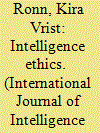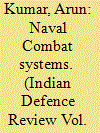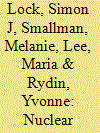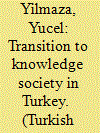| Srl | Item |
| 1 |
ID:
146423


|
|
|
|
|
| Summary/Abstract |
A spotlight has been placed on the conduct of intelligence activities pertaining to the revelations of controversial intelligence affairs (i.e., dubious methods of interrogation, such as those used at the Guantánamo Bay detention facility; the comprehensive intelligence gathering conducted by NSA, and more). As a result, the number of scholars and intelligence practitioners concerned with intelligence ethics and with the moral justifiability of the activities conducted by intelligence services has increased.1 While the issue of intelligence ethics is now present in various scholarly debates, especially in the domain of Intelligence Studies, very little attention is being drawn to developing core understanding of the concept. Also, intelligence ethics is neither homogeneous nor yet embedded as a solid research field.
|
|
|
|
|
|
|
|
|
|
|
|
|
|
|
|
| 2 |
ID:
156000


|
|
|
| 3 |
ID:
127999


|
|
|
|
|
| Publication |
2014.
|
| Summary/Abstract |
Around the world there is increasing interest from government and industry in the potential for Carbon Capture and Storage (CCS) technologies to play a part in decarbonisation. This paper examines how people with little previous exposure to CCS technology, frame and discuss it, and how in the absence of information, ideas, notions, values and experiences shape opinion. We present data from a series of focus groups held with environmental activists, planning councillors, and adult and youth community group members in London in 2012. We found that views on CCS are shaped strongly by wider factors, particularly trade offs between different energy futures. Lay-critiques were similar to those put forward by environmental groups and were strongly framed by conceptions of nuclear power. We argue that although there is little public disquiet concerning this technology in private opinions were generally negative. This, and the use of nuclear power as a framing device, may present a challenge to policy-makers and industry committed to implementing CCS while promoting education as the main mechanism for public acceptance.
|
|
|
|
|
|
|
|
|
|
|
|
|
|
|
|
| 4 |
ID:
116411


|
|
|
|
|
| Publication |
2012.
|
| Summary/Abstract |
The purposes of this study are to evaluate the phase Turkey is in with regard to the transition to a knowledge society and to discuss the priorities in relation to this process in the future. In this task, first, the concept of knowledge society is examined according to various views along with the properties that such a sociological structure needs to have. Then, the current state of Turkey is assessed. This is carried out on the basis of different studies published by International Telecommunication Union, United Nations, and Turkish State Planning Organization. In the last section, it is discussed how the transition process to a knowledge society in Turkey can be managed in a more effective and efficient way. This study points out that in Turkey important improvements especially with regard to infrastructure and education have to be achieved.
|
|
|
|
|
|
|
|
|
|
|
|
|
|
|
|